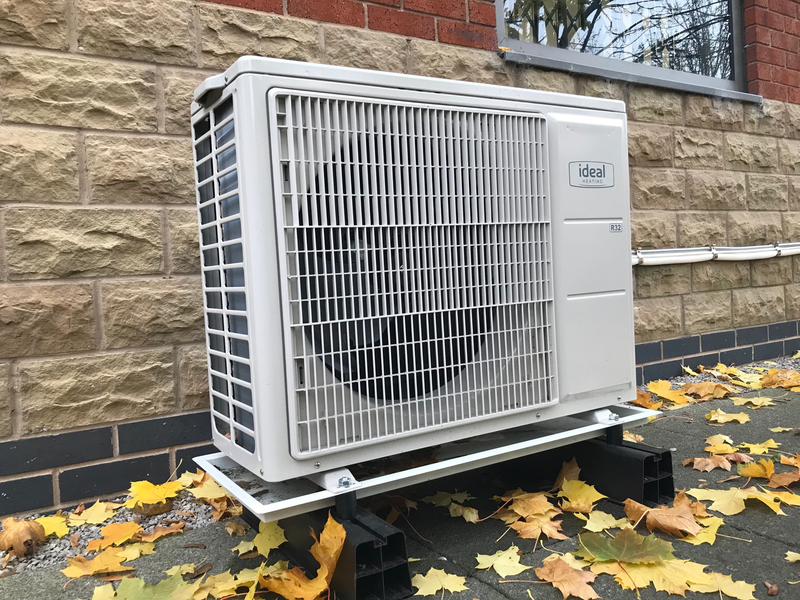The way that homes in the UK are heated has been high on the news agenda throughout 2021 and the start of 2022, with a heightened focus on energy efficiency and reducing carbon emissions. The government has committed to a national target of net-zero carbon emissions by 2050, and a key stepping stone to achieving this goal is a ban on installing gas and oil boilers in new homes by 2025. Instead, they will be heated by low-carbon alternatives such as heat pumps.
While new-build properties are the initial focus, it’s likely that heating systems in existing homes will eventually also need to be replaced with more environmentally friendly options. Electric boilers or, potentially, hydrogen boilers are possible alternatives to gas, but many property developers and homeowners might instead opt for heat pumps.
Heat pump installations
Heat pump systems operate very differently from boiler-based systems. Homes need to be prepared in order for them to work effectively, creating a need for large numbers of trained installers. As a result, companies in the heating industry are investing heavily in new technology and training.
Founded in 1906, Ideal Heating has witnessed generations of change in the heating industry, so is well placed to handle this latest transition to heat pumps. The company has been a Which? Trusted Trader since June 2021, and is now offering heat pump training courses for installers.
Which? has developed consumer-facing guides to heat pumps, including how they work, the typical costs and potential savings. Visit our ground and air source heat pumps advice guides.
Which? Trusted Traders can provide reassurance to consumers during uncertainty
Many homeowners are concerned and uncertain about how the change from gas boilers to alternative ways of heating, such as heat pumps, is going to impact their homes, and how best to prepare or make the transition. Ensuring that your company’s heating installers receive heat pump training as early as possible can in turn help them to advise and reassure customers on the best options.
And, if your business isn’t already endorsed by Which? Trusted Traders, get in touch to ask about joining. Endorsed trader Ideal Heating told us: ‘The Which? Trusted Traders mark is a clear indicator of quality to all stakeholders, setting a standard of quality that we as a company must deliver across the board in order to meet the increased expectations of stakeholders.’
Meeting the requirements of our assessment process and becoming a Which? Trusted Trader lets businesses stand out from the crowd as reliable, expert professionals. Consumers can search the Which? Trusted Trader website for boiler installers, plumbers, electricians and more.
What skills and experience do installers need before taking heat pump training courses?
Ideal Heating’s heat pump systems installer training courses are designed for qualified and experienced plumbers, heating engineers, oil engineers or gas engineers.
To take any of the courses you must already have a recognised qualification, such as N/SVQ Level 2/3 in plumbing or equivalent.
Certain other courses are also recommended or required, depending on your existing experience and qualifications (see table, below, for details).

How does the cost of heat pump training compare with gas boiler training?
The cost of heat pump qualifications is similar to the qualifications required to install gas boilers. As the market is changing, many manufacturers are making significant investments in new training and technology. Ideal Heating subsidises training courses, which helps to keep them affordable.
Here’s an overview of the heat pump training courses and packages available, and their costs:
|
BPEC Heat pump systems Four days of blended learning (theory exam and practical assessments) |
£250 |
|
Ideal Heating Alfea and Extensa ASHP product training One day of blended learning |
Free |
|
BPEC Hot water storage systems (Unvented / G3) One day of blended learning (multi-choice theory exam and practical assessments) |
£100 |
|
City & Guilds F-Gas Regulations (2079) Five days of blended learning (theory exam and practical assessments) |
£295 |
|
Heat Pump 5-day Qualifications Package Four days: BPEC Heat pump systems One day: BPEC Part L, Energy Efficiency BPEC Water regulations |
£250 |
Table notes
- If not included with the formal qualification, the engineer must hold Water Regulations and Bylaws and Energy Efficiency for domestic heating circuits.
- Low Temperature Hot Water Heating Systems (LTHWHS) is recommended for engineers who aren’t familiar with modern low-temperature systems.
- Ideal Heating also offers accommodation and meal packages to accompany the training courses.
Will installers need to pay annually for official heat pump accreditation?
While the Gas Safe Register charges an annual renewal fee, there’s currently no mandatory accreditation scheme for heat pumps. However, if an installer wants to offer services that allow customers to benefit from government-funded grants, it needs to register to a scheme such as the Microgeneration Certification Scheme (MCS).
MCS sets robust standards to ensure products and installations are high quality. A customer of an registered MCS installer can take advantage of government incentives such as the Renewable Heat Incentive (RHI) and the Smart Export Guarantee (SEG).
MCS covers the following technologies:
- Heat pumps - both ground source and air source
- Biomass
- Wind turbines
- Combined heat and power (CHP)
- Solar photovoltaic (PV)
- Solar thermal
Current fees for installers to join the MCS scheme:
- Application fee (per technology – discounts available for existing members): £120 plus VAT
- MCS licence fee: £55 plus VAT
- Annual registration fee (per technology): £470 plus VAT
- Find out about the benefits of joining Which? Trusted Traders
- More about the Trusted Traders’ Code of Conduct
- Here’s why you should choose a Trusted Trader